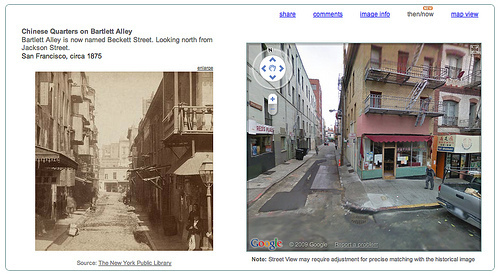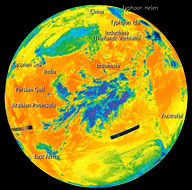Stewart Brand's Blog, page 123
April 8, 2010
Lost Landscapes of Google Maps
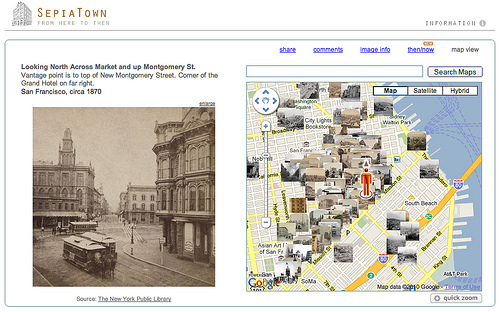
As reported on Laughing Squid SepiaTown is "A Collaborative Urban Time Machine"
SepiaTown lets you use your computer or mobile device to see what the very spot you're standing on looked like decades or centuries ago.
A Google Maps mash-up, SepiaTown allows users to upload and geotag vintage photos of urban landscapes and then serves them up for others to view. There's even a "then/now" feature that juxtaposes the old shot with the current Street View:
April 7, 2010
Nils Gilman Ticket Info
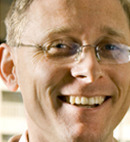 The Long Now Foundation's monthly
Seminars About Long-term Thinking
presents
Nils Gilman
on "Deviant Globalization"Monday May 3, 02010 at 7:30 pm at the Cowell Theater in San FranciscoLong Now Members can reserve 2 seats, join today!or you can purchase tickets for $10 each.
The Long Now Foundation's monthly
Seminars About Long-term Thinking
presents
Nils Gilman
on "Deviant Globalization"Monday May 3, 02010 at 7:30 pm at the Cowell Theater in San FranciscoLong Now Members can reserve 2 seats, join today!or you can purchase tickets for $10 each.About this Seminar:
Hidden and powerful and growing worldwide at twice the rate of the legal economy, "deviant globalization" is described by Nils Gilman as "human trafficking, drug dealing, gun running, cross-border waste...
You should live so long
The Long News: stories that might still matter fifty, or a hundred, or ten thousand years from now.
The woman in this picture just celebrated her 100th birthday. But she's far from the oldest living American: that's Neva Morris, of Ames, Iowa, who's 114. They're just two of the 84,000 centenarians living in the United States.
It's estimated that by 02050, the number of centenarians worldwide will reach nearly 6 million. And some say that half of the babies born in the U.S. today will...
April 6, 2010
Manual for Civilization

Trees begin to take hold in a bit of sun in an abandoned Detroit building.
Today we received another email about creating a record of humanity and technology that would help restart civilization. The latest one is inspired by an essay that James Lovelock published in Science over 12 years ago called A Book For All Seasons (excerpt):
We have confidence in our science-based civilization and think it has tenure. In so doing, I think we fail to distinguish between the life-span of civilizations...
April 5, 2010
David Eagleman, "Six Easy Steps to Avert the Collapse of Civilization"
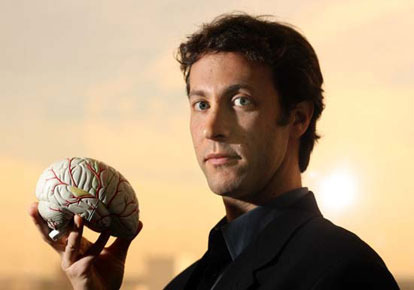
Averting Collapse
Civilizations always think they're immortal, Eagleman noted, but they nearly always perish, leaving "nothing but runes and scattered genetics." It takes luck and new technology to survive. We may be particularly lucky to have Internet technology to help manage the six requirements of a durable civilization:
1. "Try not to cough on one another." More humans have died from epidemics…
Read the rest of Stewart Brand's Summary







Solar Beat
Click the image above to see the Solar Beat page aand make sure your sound is turned on.
Solar Beat is a project by White Vinyl Designs that uses a virtual Orrery as a type of music box. Turn on your sound and click the image above to see what type of music our solar system makes… (thanks to Chris Baldwin for sending this in)







April 1, 2010
Dumpster Diving for Science
Or: Techno-Archaeology and the Tale of the Whale-Oil Tapes
Researchers at NASA's Ames Research Center recently were able to recover some very old and useful data. The Nimbus II satellite created a detailed mosaic of the earth's cloud cover and heat radiation in 1966. Such old and detailed climate data is a boon to today's researchers, but it wasn't easy to come by. Indeed, the data was lost for quite some time due to the tapes on which it was recorded – the secret to their longevity w...
March 31, 2010
Long News at TED
Kirk Citron, the man behind Long News here on this blog, was invited to give a short talk on it at this years TED conference in Long Beach. They just posted the video which you can see above. Congratulations to Kirk, and big thanks for coming to us with the idea and doing such a great job curating!







March 29, 2010
The Case For Forgetting…

Death Bear visits clients in their homes and accepts love letters, old photos, anything they can't just throw away. The man behind the mask, Nate Hill, says he wants to create art that helps people. (Carolyn Cole / Los Angeles Times / March 18, 2010)
At The Long Now Foundation we spend a lot of time trying to figure out how to preserve information and artifacts from our increasingly ephemeral culture. A piece in the LA TImes sent in this morning by board member Paul Saffo reminded me of a...
March 17, 2010
Rushdie's digital decay
Salman Rushdie at Emory University in Atlanta, which is currently exhibiting his personal archive, including personal papers, and electronically produced drafts of his novels.
Stewart Brand sends in this excellent piece in the The New York Times on what I am sure is to be an oft repeated story. As museums ingest invaluable intellectual material from authors and thinkers that increasingly will have never used paper, they are finding that preserving this data is a many layered problem. Huge...
Stewart Brand's Blog
- Stewart Brand's profile
- 291 followers


